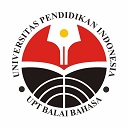Discourse Structure Analysis of Making Request in Japanese Conversation
Abstract
Keywords
Full Text:
PDFReferences
Bernsten, S. G. (2002). Using Conversation Analysis To Evaluate Pre-Sequences in Invitation, Offer, and Request Dialogues in ESL Textbooks. Graduate College of the University of Illinois at Urbana-Champaign.
Ding, L. (2012). On the Request Expression in Japanese Textbooks in China. Bulletin of Kyushu University, 3(1).
Fox, B. (2014). On the notion of pre-request. Discourse Studies, 23.
Horiguchi, S. (2005). Japanese Language Education and Conversation Analysis (日本語教育と会話分析) (3rd edition). Tokyo: Kuroshio Publishing.
Indraswari, T. I., Meisa, W., Rachmawati, D., & Ariyani, L. P. (2021). Perception and Modification: A Pragmatic Study of Irai Hyougen by Japanese Learners. IZUMI, 10(1), 67–83. https://doi.org/10.14710/izumi.10.1.67-83
Jones, K., & Ono, T. (2005). Discourse-Centered Approaches to Japanese Language Pedagogy. Japanese Language and Literature, 39(2), 237. https://doi.org/10.2307/30038901
Lebra, T.S. (1976). Japanese Patterns of Behaviors. University of Hawaii Press.
Li, L., & Ma, W. (2016). Request sequence in Chinese public service calls. Discourse Studies, 18(3), 269–285.
Miyatani, A., Kurono, A., Kobayashi, M., Doi, M., & Fukunaga, Y. (2001). Discourse Structures of the Conversation Models on making requests. 8(2). https://www.jstage.jst.go.jp/article/jlem/8/2/8_KJ00008196767/_article/-char/ja/
Martin, J.R. (1992). English Text: System and Structure. Amsterdam: Benjamins.
Martin, J. R., & Rose, D. (2007). Working with discourse: Meaning beyond the clause. Continuum.
Martin, J. R., & Rose, D. (2008). Genre Relations: Mapping culture. London: Equinox.
National Institute for Japanese Language and Linguistics (NINJAL). BTSJ (Basic Transcription System for Japanese)- Japanese Natural Conversation Corpus.
Nguyen, T. N. Y. (2014). Japanese-Vietnamese Contrastive Study on Discourse Structure in Request Conversation—Focusing on the Burden of Request Content. Japanese and Japanese Cultural Research, 24, 93–103.
Nguyen, T. N. Y. (2017). The Strategies of “Chat-part” in Request Conversations From the perspective of comparative analysis of Vietnamese and Japanese. Japanese Language Education Research, 8, 2014.
Nitta, Y. (1991). Modality and Person in Modern Japanese (Nihongo no Modaritii to Ninshoo). Hitsuji Shobo.
Onuma, K. (2011). About the hierarchy of the introduction. Bulletin of Faculty of Distribution and Information Studies, Ryutsu Keizai University, 27–40.
Park, S., Jeon, J., & Shim, E. (2021). Exploring request emails in English for business purposes: A move analysis. English for Specific Purposes, 63, 137–150. https://doi.org/10.1016/j.esp.2021.03.006
Ri, Z. (2002). Discourse Analysis of “Requests” in Chinese and Japanese. Kyushu University Institutional Repository. https://doi.org/10.15017/4494523
Taleghani-Nikazm, C., & Huth, T. (2010). L2 requests: Preference structure in talk-in-interaction. Multilingua 29: 185-202. DOI 10.1515/mult.2010.008
Taleghani-Nikazm, C. (n.d.). Request Sequences. In Sidag.19. John Benjamins Publishing Company. Retrieved September 5, 2022, from https://benjamins.com/catalog/sidag.19
Thornbury, S., & Slade, D. (2006). Conversation: From description to pedagogy. Cambridge University Press.
Tsujioka S. (2021). Investigation of Request Expressions in Japanese Textbooks. Kansai daigakuin bungaku kenkyuu-ka. https://doi.org/10.32286/00022674
Usó-Juan, E. (2007). The Presentation and Practice of the Communicative Act of Requesting in Textbooks: Focusing on Modifiers. In E. A. Soler & M. P. S. Jordà (Eds.), Intercultural Language Use and Language Learning (pp. 223–243). Springer Netherlands. https://doi.org/10.1007/978-1-4020-5639-0_12
Xu, M. B. (2006). Consideration of Requested Conversation [Preceding Part] -Compare role-play data of Japanese native language scenes, Taiwanese native language scenes, and Japan-Taiwan contact scenes. 219–238.
Yu, H. (2012). Japanese-Korean Contrastive Study of Requested Discourse: From the Perspective of Structure and Strategy of Discourse (Irai danwa no nikkan taishoo kenkyuu: danwa no koozoo sutoratejii no kanten kara). Tankobon.
DOI: https://doi.org/10.17509/japanedu.v8i2.61548
Refbacks
- There are currently no refbacks.
Copyright (c) 2023 JAPANEDU: Jurnal Pendidikan dan Pengajaran Bahasa Jepang

This work is licensed under a Creative Commons Attribution-ShareAlike 4.0 International License.
 Published by:
Published by: Department of Japanese Language Education, Faculty of Language and Literature Education
Universitas Pendidikan Indonesia
 Online ISSN: Online ISSN:2528-5548 |

JAPANEDU: Jurnal Pendidikan dan Pengajaran Bahasa Jepang (e-ISSN:2528-5548) lisenced under a Creative Commons Attribution-ShareAlike 4.0 Internasional (CC BY-SA 4.0)

